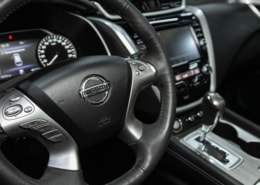Questions to Ask Yourself Before Buying an Auto Warranty
Purchasing an extended warranty is one of the best ways to avoid unexpected costs if your vehicle breaks down during the first year of ownership.
Similar to an insurance policy, you may or may not use it, but you’ll be glad you have one if your vehicle has any mechanical issues.
Table of Contents
- Do I have to buy a warranty from the dealer?
- When should I buy an auto warranty?
- Are warranty prices negotiable?
- Do I need coverage?
- Can I afford an auto warranty?
- Will you keep the vehicle for a long time?
- Should you compare shop warranty prices?
- Can you buy a warranty if your factory coverage is expired?
- What type of auto warranty should I buy?
- How much is the deductible?
- What if I can’t finance my extended warranty?
Do I Have to Buy a Warranty from the Dealership?
The short answer is NO!
Dealers and their staff want you to believe you must buy a warranty when you buy a car. This is NOT TRUE; you can purchase coverage from any company you choose at any time you want.
Extended coverage is not for everyone, and policies differ in price and coverage. So exactly how do you know which one’s right for you?
Answer some of the questions below to help decide if you should purchase an auto warranty.
When Should I Buy a Warranty?
You can wait until your factory warranty is about to expire; however, we don’t recommend it.
The longer you wait, the more expensive it will be. A couple of the critical factors a warranty company looks at are the age of the vehicle and how many miles it has.
The newer the car, the lower the miles equals less risk for the warranty provider.
Are Extended Warranty Prices Negotiable?
A little-known fact most people are unaware of is warranty prices, just like automobiles, are negotiable. Most car dealerships will take an $800 warranty and mark it up to $2500 or more before offering it to the consumer.
They will then want you to “ROLL” the additional cost into your car loan, which will cost you even more. Going into a car dealership not armed with this knowledge will cost you financially.
Do I Need an Extended Warranty?
Before buying an extended warranty for your vehicle, ask yourself a few questions to decide if you truly need one or not.
Did you know?
- “Wear and tear” and “mechanical breakdown” are different types of warranty coverage.
- Most vehicle service contracts define “mechanical breakdowns” as workmanship issues or defective parts.
- However, “wear and tear” coverage includes components that wear out with regular use and over time.
- Only the best-extended warranty providers will include wear and tear coverage.
- As your vehicle ages, you can see how vital wear and tear coverage is.
- You do not have to buy an extended warranty from the dealership when you buy your vehicle. Although a dealer will tell you otherwise, you may purchase coverage for your car from any company you choose.
- Comparison shop extended warranties to find the best price and right coverage to meet your driving needs.
- Use free quotes to level the playing field in negotiating warranty coverage with a dealership.
Can You Afford to Buy Auto Warranty Coverage?
The most important question is, “Can I afford to pay out of pocket for a major repair if my vehicle breaks down?”
Suppose you feel confident and are financially able to pay for an unexpected $3500 repair (more or less). You will probably not need to purchase an extended warranty.
If you have this kind of financial freedom, it is your personal choice to purchase additional coverage.
Will You Keep the Vehicle for a Long Period?
Suppose you’re one of those people that get tired of your vehicle every three years and don’t drive that often. You probably do not need to purchase an extended warranty.
If you’re leasing a vehicle for 36 months or less, you don’t need an extended warranty. The dealer will still try to sell you one but don’t do it; it’s a scam!
Most Manufacturers’ warranties will cover any significant mechanical breakdowns for three years and 36,000 miles. With the Manufacturer’s warranty still in effect, buying an extended warranty past that point is a waste of money.
Suppose you’re one of those who quickly put a lot of miles on a vehicle or drive a car until it falls apart. You may consider purchasing one for added coverage and peace of mind.
Should I Compare Shop Auto Warranties Online?
Most extended warranties sold through new and used car dealerships are through a third party, and the dealer is acting as the middle man.
Many dealers own the company providing the coverage, and they’ve set up the company under a different name to give the consumer a sense of security.
The cheapest extended warranty may not be the best coverage available for you!
The cheapest extended warranty may not be the best warranty for you and your driving needs. Always comparison shop for the best price before buying one at the last minute from a car dealerships finance department.
The best place to comparison shop is online. Many warranty companies will provide free no-obligation price quotes on any vehicle.
Recommended Auto Warranty Company

Visit Complete Car Warranty >>
Can I Buy a Warranty if My Factory Warranty is Expired?
Yes, you can. Many people don’t realize their vehicle may still be eligible for extended coverage after their manufacturer’s warranty has expired.
Once a manufacturer’s warranty expires, a vehicle is more prone to mechanical and system failures. Most cars under 10 model years old and 150,000 miles are still eligible to receive some extended coverage.
Keep in mind the older your vehicle gets and the more miles you put on it; the more expensive the warranty will be.
Type of Auto Warranty Should I Buy?
Although extended warranty companies may call their policies fancy names, they can be condensed into three different categories.
- Named Component Warranty – Also known as an inclusive warranty, this type of coverage is black and white. It will cover your vehicle’s major mechanical breakdown or significant mechanical systems. If the part is not listed on the contract, then the policy will not cover it.
- Powertrain Warranty – This extended warranty only covers the engine, transmission, and certain parts of the drivetrain. Powertrain warranties only cover the parts in which oil flows through the vehicle (internally lubricated parts). As past statistics show, these parts of an automobile are the least likely to fail. Please remember a car has thousands of static and moving parts. A powertrain warranty does not cover these “other parts.” Some people question if a powertrain warranty is genuinely an extended warranty?
- Exclusionary Warranty – Also known as a bumper-to-bumper warranty, this type of policy covers nearly all of a vehicle’s mechanical systems except for the parts listed on the policies “exclusion list.”
The exclusion list will have all the parts or systems NOT covered by an exclusionary warranty. It’s in your best interest to find and review this list carefully to ensure you have the parts you will want to cover on your policy.
More auto warranty tips
- Companies will sometimes sell auto warranties very similar to each other. Salespeople may call them all by the slang term “Bumper-to-Bumper,” not knowing any difference, and this can be misleading to the consumer.
- Never take anyone’s word for what a warranty covers. When inquiring about an extended warranty, ask, “What is not covered, rather than what is covered by the policy.”
- Most normal wear and tear items (consumable items) such as belts, hoses, windshield wipers, and brake pads are never covered on auto warranties. You can get added perks such as travel reimbursement, roadside assistance, and travel lodging. Make sure you ask and understand what all is included when selecting a warranty.
How Much is the Warranty Deductible?
Always research how much and what kind of deductible you are responsible for before signing the contract. Some warranties are deductible per repair item, and some have deductibles per repair visit.
- Per repair item deductible – The overall cost of these extended warranties may be cheaper upfront; however, you will have to pay a deductible for each covered repair item you have fixed on your vehicle.
- Per repair visit deductible – This type of extended warranty may be a little higher overall cost. However, you will only be charged a single deductible no matter how many covered repair items you have fixed under your warranty.
An example of the above deductibles would be this:
Let’s say you have a $100 per visit deductible. You take your vehicle in for an alternator, starter, and fuel pump problem. Your deductible would only be $100. If you had a per repair item deductible, you would be charged $100 for each item or $300.
Another thing to be aware of about warranty deductibles is how much is the deductible? Warranty deductibles may range from $50 to $250 or more?
The higher the deductible means typically, the cheaper the overall cost of the warranty. Do your research when finding the one that best fits your budget.
There are $0.00 deductible policies out there. You may have to pay a little more or a surcharge to get this coverage; however, if you find yourself taking your car infrequently or want peace of mind, you do not have to come out of pocket in the future. You may find this kind of policy to best fit your needs.
What if I Can’t Get My Warranty Cost Financed?
On rare occasions, a bank may not finance the added amount of an extended warranty on a car loan. Sometimes a car dealership will mark up a warranty so high the lender will not fund it because the “Loan-to-Value” is, for lack of better words, out-of-whack.
If a car dealership or lender tells you, they cannot include the extended warranty in your car loan. You may want to look at it as a blessing and do some comparison shopping online. Online companies such as Complete Car Warranty and Endurance Vehicle Protection offer low-interest payment plans.
You may find the perfect extended warranty at a lower price and not have to pay the high-interest rates the dealer was attempting to charge you.









